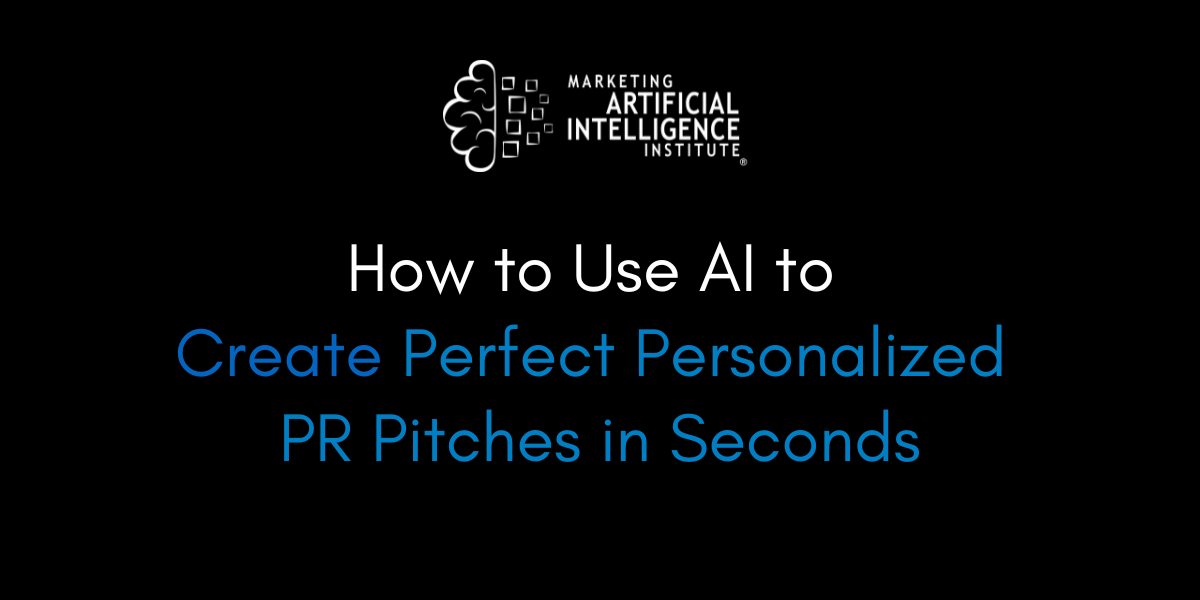PRophet is a communications technology suite that uses AI to empower modern communicators.
It does that by using AI to create the perfect media pitch, then predict which journalists are most likely to run your story based on millions of articles. It also finds the most appropriate social media content creators to amplify your brand's messages.
The result? A smarter way to do PR, made possible by AI built by PR industry leaders.
We spoke with PRophet Chief Marketing Officer Jason Brandt to learn more about how this AI marketing solution works.
In a single sentence or statement, describe PRophet.
Founded in 2020 by PR industry leader Aaron Kwittken, PRophet is an award-winning suite of essential, AI-powered Comms Tech tools purpose-built to empower modern communicators to perform more effectively and efficiently by quickly uncovering and engaging with high-authority journalists and leading influencers.
The suite consists of three products: Earn, Influence and Monitor, with Earn as the first-ever AI-powered PR tool that helps users generate spot-on media pitches and then suggests and ranks journalists more likely to run the story based on the millions of articles we ingest daily. This AI guarantees recency and relevancy which is critical to comms success.
How does PRophet use AI in its products or services?
For Earn, PRophet uses generative AI to help marketers craft a more effective PR pitch to attract journalists and then our predictive AI matches the pitch against millions of articles to compile a custom list of journalists more likely to run the story.
We do not use customer data to train a large language model (LLM). We created, and continue to adjust, our own custom algorithm adapted based on the factors we know are interesting to journalists.
For Influence, we use AI to find the most appropriate social media content creator for a brand content program. We ingest publicly available data on the influencer and then use custom AI to more effectively rank oder the best influencers for the job.
What are the primary marketing use cases for your AI-powered solutions?
- Brands looking to find, engage with social media influencers more effectively.
- Brands looking to target specific audiences through influencer marketing.
- Small to large PR teams in agencies and brands looking to land more stories with journalists they do not have relationships with.
- PR teams looking to generate more effective pitches using our vertical AI solution.
- Agencies who cannot afford or don't have the appetite to create their own tech when they can rent it form us.
- Staff training using our custom-created point solution.
What makes your AI-powered solution smarter than traditional approaches and products?
Built by lifelong practical, in-the-trenches PR leaders and practitioners, the founders saw the need to innovate an industry stuck in the past. We deliver time savings at a fraction of the cost of a full PR team. But more importantly, we are teaching a brand new generation of PR and marketing professionals how to integrate AI into their day to day jobs. Unlike other solutions, we started with our AI as the problem solver, not AI as an add-on to take advantage of the AI boom.
Are there any minimum requirements for marketers to get value out of your AI-powered technology? (e.g. data, list size, etc.)
No. Marketers simply need to have a PR story in mind, or a social media marketing brief and the platforms will do the rest.
Who are your ideal customers in terms of company size and industries?
Any company that has a PR/comms/social media team is a target. We have found success in smaller teams and larger teams across agencies and brands. We have built the tools to drive collaboration, so we make many seats available so teams can work together. Most of our terms include unlimited usage to encourage day to day usage—we don't want to punish for rampant adoption.
What do you see as the limitations of AI as it exists today?
Marketing teams being educated enough to confidently shop for the right tools to meet their needs, and then the organizations appetite for pushing and supporting engagement and adoption.
As companies think about AI as a need to have (vs. just a test) they need software solution that also have credible and helpful support to ensure the tech is being used to its full capability. AI solutions also need better, simpler interfaces, and bundled so teams can try lots of solutions all at once vs. having to shop one by one.
What do you see as the future potential of AI in marketing?
In our space, we see predictive as the holy grail. Generative has grabbed the headlines, but is quickly becoming a commodity. Predictive will ultimately collapse workflow into single streams but more importantly use real time data to anticipate workflow vs. help respond to it.
Any other thoughts on AI in marketing, or advice for marketers who are just starting with AI?
Know the questions to ask a product team, ensure the organization can ingest tools in a way to make the teams time effective and the investment pay out, have a reasonable set of goals, invest senior management and practitioners because without dual buy-in, adoption can suffer.
Mike Kaput
As Chief Content Officer, Mike Kaput uses content marketing, marketing strategy, and marketing technology to grow and scale traffic, leads, and revenue for Marketing AI Institute. Mike is the co-author of Marketing Artificial Intelligence: AI, Marketing and the Future of Business (Matt Holt Books, 2022). See Mike's full bio.




